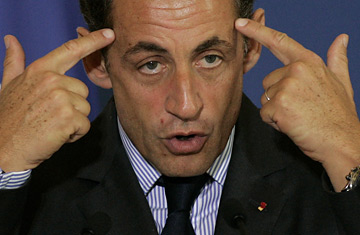
France's President Nicolas Sarkozy
During the opening months of his presidency, Nicolas Sarkozy earned lavish praise and applause for his active engagement and seeming omnipresence on the international stage. But now hunkered down to face a series of daunting challenges at home, the French President is steeling himself for several stressful months of grappling with economic malaise, social conflict and an increasingly chilly relationship with France's voters
Since the nation returned to work from summer vacations last month, scarcely a day has passed without additional gloomy economic news undermining the can-do confidence Sarkozy had sought to instill in the French public. In September, it was announced that the nation's slowly shrinking unemployment rate had reversed course and increased slightly during the previous month to nearly 8.1%. Later, word came that the year-end economic growth the government had hoped might reach 2.5% was set to increase only 1.8%, in part due to French businesses continuing to create few new jobs.
The French then learned the nation's health care system would finish 2007 over $19 billion in the red — 30% more than initially expected — and would run at least another $11.2 billion over a budget Sarkozy is seeking to pass for 2008. The budget itself is highly controversial: despite eliminating nearly 23,000 civil service jobs, it would still run a 2.3% deficit (worth nearly $59 billion) due in large part to nearly $20 billion in income tax cuts that critics say mostly benefit the wealthy. Like its 2007 predecessor, the 2008 budget is also built upon estimated 2% to 2.5% economic growth and tax revenues many economists consider fanciful.
In the midst of this bleak news — and as Sarkozy was in the U.S. thrilling observers with a speech to the United Nations on September 25 — French Prime Minister François Fillon described the nation's financial and economic state as "bankrupt", and indicated serious belt-tightening would be required to address the situation. Fillon soon regretted the public concern the term provoked: as Sarkozy returned from New York with assurances that "there are no austerity plans" for France, Fillon found himself obliged to explain his use of "bankrupt" as glib and non-literal. A French public groggy with weeks of bad economic news seemed to doubt Fillon's stand-down, Sarkozy's promises, and either man's ability to turn things around quickly. Both suffered almost immediate dips of support in polls.
"All this grim economic news represents Sarkozy's return to hard reality, where essentials won't turn around and pick up with a rousing performance or deft spin of events," says Dominique Reynié, a political analyst at the Foundation of Political Sciences in Paris. "His initial successes involved passing tougher immigration law, opening up cabinet posts to leftist politicians, raising France's profile in international affairs — all things that produce big headlines, but whose real impact are hard to measure. And with economic worries now overtaking that earlier buzz, I think it's fair to say Sarkozy has failed in his biggest early goal: creating a shock wave of confidence convincing the French that things are moving in the right direction and getting better quickly."
Lack of confidence may also mean lack of patience with new policies Sarkozy is preparing — starting with his plans to align so-called "special regimes" requiring civil servants to work fewer years to qualify for pensions closer to longer private sector schemes. To do so, Sarkozy has begun consultations with unions and their state-owned employers, and pledged to adapt the reform to the specifics of certain jobs, companies, and sectors before passing it into law and applying it — probably next year. But as they did with the month-long strikes that crippled the nation in 1995 (and eventually led to the right's ouster from power), public transport and utility workers are seeking to derail Sarkozy's proposed pension reform before it leaves the platform by scheduling walkouts and mass protests for October 18. Other public service workers have voted to strike separately on a later date, and possibly join forces with transport workers if Sarkozy refuses to pull back his plan.
But the fast-moving, tough-talking Sarkozy cannot afford to delay the special regime reform for calmer times without damaging the reputation and credibility he has built on being a man of action. That means the highest-stakes showdown of his administration is all but inevitable. "If he achieves this reform by overcoming big protests, he'll have satisfied the 50% of public opinion approving the measure, thrill fellow conservatives, and re-establish himself as the formidable leader who inspires the French," says Reynié. "If he fails, he's in serious trouble. The reform movement will be stalled; the left revived, conservative rivals will be emboldened to challenge him, and public respect for him blown apart. But there's no going back for Sarkozy now, and the coming months will be critical to his presidency."
